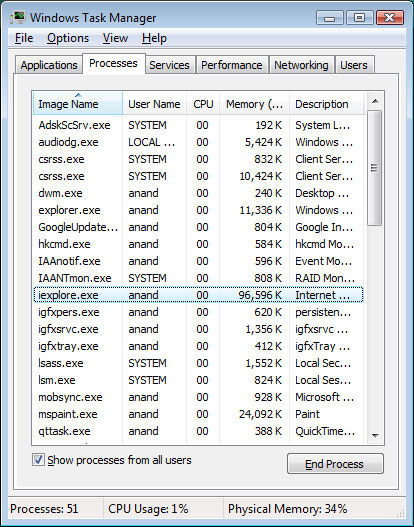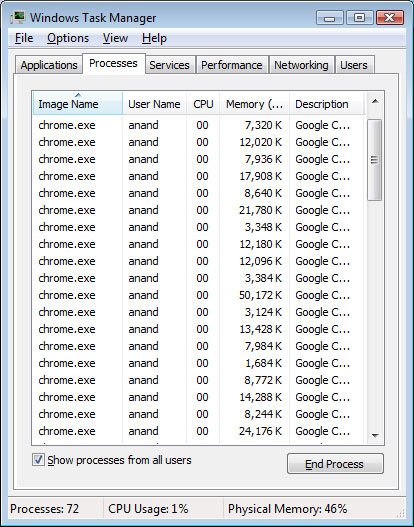Google Chrome: Performance and First Impressions
by Anand Lal Shimpi on September 3, 2008 12:00 AM EST- Posted in
- Software
More Efficient Memory Management
Fire up an IE7 window with 10 tabs in it and you’ll see this in your Task Manager:

A single iexplore.exe process that spawns a number of threads. The same goes for Firefox and Safari. The problem here is that if a single tab causes the process to crash, all of your open websites go with it. Chrome treats each tab as an individual process, which adds a little more overhead but the benefit is a single website won’t cause all of your other browser tabs/windows to crash.

You shouldn't lose all Chrome windows/tabs due to one misbehaving website/app
A single webpage stalling also won’t cause the rest of the tabs to stall, while the tabs in a Chrome window look physically connected, they are as independent as they get.
Chrome, as a result, will take up quite a bit of space in Task Manager:

Making each tab its own process means that you get memory back from closed tabs much quicker and much more efficiently than with other browsers. Consider this test: 1) Visit www.anandtech.com, 2) open tabs for digg.com, docs.google.com (and login) and www.facebook.com (and login), 3) Close the latter three websites.
I performed that exist test, in that order, and measured memory size after each step. The results are below:
| Websites | Google Chrome 0.2.149.27 | Internet Explorer 7.0.6001.18000 | Firefox 3.0.1 | Safari 3.1.2 |
| Just AnandTech.com | 26MB | 30MB | 30MB | 48MB |
| AT + Digg + Google Docs + Facebook | 105MB | 97MB | 87MB | 104MB |
| AT (After closing 3 tabs) | 38MB | 78MB | 70MB | 107MB |
Just viewing AnandTech alone, Chrome ended up being the most efficient browser with a 26MB footprint compared to 30MB for Firefox 3.0.1, 30.1MB for IE7 and a whopping 48MB for Safari 3.1.2.
Adding the other three sites brings the totals up to 104MB for Chrome, 104MB for Safari, 96MB for IE7 and 87MB for FF.
It’s closing the tabs that’s the most interesting: only Chrome actually frees up memory upon closing tabs. Chrome’s footprint is still larger than its original 26MB at 38MB, but the remaining three browsers continue using at least 70MB. The argument here is that these other browsers already have memory allocated should you open additional tabs, unfortunately you can quickly run into memory fragmentation issues with the conventional approach should the new tabs require more memory than the ones you just closed.
With Chrome, each tab is its own process, when you’re done with a tab - close it and you get all your memory back right away. You get more efficient usage of memory for newly created tabs.
The independent tabs are also physically independent within the UI, you can drag any tab out of a window and into another one or make it a new window by itself.
Chrome’s multi-process approach is also theoretically better for multi-core systems since you don’t have to worry about exploiting parallelism within a process, you’ve got process-level parallelism giving you more than enough threads to distribute across many cores. Thankfully web browsing isn’t the most CPU intensive and this process-level parallelism doesn’t amount to a huge performance benefit.










105 Comments
View All Comments
mmntech - Wednesday, September 3, 2008 - link
That's my issue with Chrome. I know a lot of people think ABP is "stealing" the internet but for me, it's become an essential part of browsing. I think that's the only reason why I wouldn't use Chrome as a primary browser.That said, I am quite impressed with the speed of the browser. It's at least as fast as Safari and used half the RAM that Firefox 3 does. It would be ideal for low powered systems such as netbooks with 512mb of RAM or less. It will be interesting to see how the Mac and Linux versions turn out.
granulated - Wednesday, September 3, 2008 - link
....and something along the lines of "Stylish" is ESSENTIAL to me.I'll have another look at it in a few months and see if they've added some customisation options.
evildorf - Wednesday, September 3, 2008 - link
Why not compare to IE8 rather than IE7? After all, Chrome is a 'beta' too.Anyway, I like Chrome's minimal stuff-around-the-edges, but found the window appearance a bit jarring. For my usual Internet browsing, it performs well, though without any noticeable differences from Firefox or IE.
Christoph Katzer - Wednesday, September 3, 2008 - link
As your performance test showed, some sites seem to be much faster and some much slower. Slower until now are almost all German newssites. The popup-blocker worked better in Firefox and I am missing adblock ;)As for the looking it is quite cool, I like the thin and sleek design. Everything seem to work properly without exceptions, just hope the security features hold what they've promised... until now no problems with design of the websites except www.spiegel.de and their ad.
Visual - Wednesday, September 3, 2008 - link
the table on page 4 doesn't fit - the long url http://images.google.com/images?hl=en&q=red&am...">http://images.google.com/images?hl=en&q=red&am... in the first column makes it stretch too much, and the other columns disappear under the dailytech articles on the right.phatboye - Wednesday, September 3, 2008 - link
Why was opera not included for comparison? I would like to see a really in-depth review on all the popular current browsers; konqueror, galeon, opera, firefox, safari, ie, chrome, seamonkey, camino and avant.Tegeril - Wednesday, September 3, 2008 - link
Even saying that Konqueror, Galeon, Seamonkey, and Avavnt are popular, current browsers undermines your credibility for suggesting that Opera is a popular, current browser. Which it is not.Griswold - Thursday, September 4, 2008 - link
Well doh, numbnuts. Opera still IS a popular browser.Baked - Wednesday, September 3, 2008 - link
The O fanboys will not be pleased.SonicIce - Friday, September 5, 2008 - link
It's all about the O.